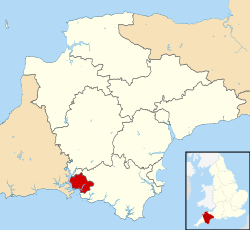Plymouth
Plymouth (/ˈplɪməθ/ (![]() listen)) is a city and unitary authority in South West England. It is on the south coast of Devon, about 36 miles (58 km) south-west of Exeter and 193 miles (311 km) south-west of London. Cornwall is to its west and south-west.
listen)) is a city and unitary authority in South West England. It is on the south coast of Devon, about 36 miles (58 km) south-west of Exeter and 193 miles (311 km) south-west of London. Cornwall is to its west and south-west.
Plymouth | |
|---|---|
 Clockwise from top: West Hoe, Smeaton's Tower, University of Plymouth, Royal William Yard, National Marine Aquarium, Southside St, Barbican | |
| Nickname: Britain's Ocean City | |
| Motto(s): | |
 Plymouth shown within Devon and England | |
| Coordinates: 50°22′17″N 4°08′32″W / 50.37139°N 4.14222°W | |
| Sovereign state | United Kingdom |
| Country | England |
| Region | South West England |
| Ceremonial county | Devon |
| City status | 1928 |
| Unitary Authority | 1998 |
| Government | |
| • Type | City Council |
| • Body | Plymouth City Council |
| • Executive | NOC |
| • Lord Mayor | Sam Davey[2] |
| • HQ | Civic Centre Precinct |
| • Wards | 20 |
| • MPs | Johnny Mercer (C) Luke Pollard (L) |
| Area | |
| • Total | 30.82 sq mi (79.83 km2) |
| • Rank | 240th (of 326) |
| Highest elevation | 509 ft (155 m) |
| Lowest elevation | 0 ft (0 m) |
| Population (2005 est.) | |
| • Total | 264,200 |
| • Rank | 56th (of 326) |
| • Density | 8,600/sq mi (3,300/km2) |
| • Demonyms | Plymothian (formal) Janner (informal) |
| Time zone | UTC0 (GMT) |
| • Summer (DST) | UTC+1 (BST) |
| Postcode district | |
| Area code | 01752 |
| Website | plymouth |
Humans in the Plymouth area started in the Bronze Age when a first settlement was made at Mount Batten. This settlement continued as a place for trading for the Roman Empire, until the nearby village of Sutton started in the ninth century was used instead, which is now called Plymouth. In 1588, an English fleet from Plymouth defeated the Spanish Armada. In 1620, the Pilgrim Fathers left Plymouth for the New World and started Plymouth Colony, the second English settlement in what is now Massachusetts, United States. During the English Civil War, the town was held by the Parliamentarians.
Through the Industrial Revolution, Plymouth became a global port, with boats from the United States carrying passengers and goods. The nearby town of Devonport became important to the Royal Navy for its shipyards and dockyards. In 1914, three towns (the county borough of Plymouth, the County Borough of Devonport, and the urban district of East Stonehouse were merged, becoming the County Borough of Plymouth. In 1928, it became a city. During World War II, due to the city being important to the navy, the German military destroyed some of the city by bombing, an act known as the Plymouth Blitz. After the war, the city centre was completely rebuilt. Plymouth grew and the towns of Plympton, Plymstock became part of it in 1967.
The city has a population of 264,200 (mid-2016 est.) people, making it the 30th-most populous built-up area in the United Kingdom and the second-largest city in the South West, after Bristol. It is governed locally by Plymouth City Council and nationally by two MPs. Plymouth's economy is based mostly on ships. It has ferry links to France (Roscoff and St Malo) and to Spain (Santander). It has the largest working naval base in Western Europe, HMNB Devonport, and also has the University of Plymouth. Plymouth is called a "Small-Port City" using the Southampton System for port-city classification.[4]
History change
The Roman Catholic Bishop of Plymouth has his cathedral here. Plymouth was badly affected by German bombing during the Second World War, when many buildings were destroyed. The Plymouth Fathers and the Plymouth Brethren were both named after Plymouth. Plymouth is linked to Saltash in Cornwall by two bridges across the River Tamar: the Royal Albert Bridge (built in 1859) carries the railway line to Penzance and the Tamar Bridge the A38 main road. On Plymouth Hoe is the third lighthouse, which used to stand on the Eddystone Rock in the English Channel.
Sports change
It has a football team called Plymouth Argyle and a rugby football team called Plymouth Albion.
References change
- ↑ "Brief history of Plymouth". Plymouth City Council. Archived from the original on 6 July 2013. Retrieved 20 July 2008.
- ↑ "The Lord Mayor". Plymouth City Council. Archived from the original on 8 December 2015. Retrieved 2 December 2015.
- ↑ "Standard Area Measurements (2016) for Administrative Areas in the United Kingdom". Office for National Statistics. 1 February 2017. Retrieved 9 February 2017.
- ↑ Roberts, Toby; Williams, Ian; Preston, John (2021). "The Southampton system: A new universal standard approach for port-city classification". Maritime Policy & Management. 48 (4): 530–542. doi:10.1080/03088839.2020.1802785. S2CID 225502755.


